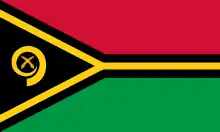Toga Island
Toga (in Lo-Toga Toge [ˈtɔɣ̞ə]) is an island in the Torres group, within the Torba Province of Vanuatu.[2][3][4]
 Map of Toga Island | |
 | |
| Geography | |
|---|---|
| Location | Pacific Ocean |
| Coordinates | 13°25′S 166°41′E |
| Archipelago | Vanuatu, Torres Islands |
| Area | 18.8[1] km2 (7.3 sq mi) |
| Highest elevation | 104 m (341 ft) |
| Highest point | Mt Lemeura |
| Administration | |
| Province | Torba Province |
| Largest settlement | Sola |
| Demographics | |
| Population | 250 (2012) |
Geography
Toga Island is the most southern of the Torres Islands. The island's size is 6 km by 4.5 km. The estimated terrain elevation above sea level is 104 meters.[5] Toga is surrounded by a narrow fringing reef quickly dropping off into deep water. The summit of the island is Mt Lemeura (locally Lēmere [ˈlemərə]) located on the western side of the island.[6] The climate on Toga is humid tropical. The average annual rainfall is about 4000 mm. The island is subject to frequent cyclones and earthquakes.
Population
Toga is the most populated island in the Torres Islands, with about 250 people. They speak the Toga dialect of the Lo-Toga language. The population lives in two villages: Liqal [liˈkʷal] and Litew [liˈtəw]. An ancient village, now abandoned, was called Qururetaqō [kʷurʉrətakʷo].
Animals and species
Barn owls are known to live in the area. Many samples of the owl's bones were found in a cave in Toga, which were reviewed by scientists. Their pray were geckos and rats.[7]
References
- "Vanuatu". Haos Blong Volkeno. Retrieved 8 August 2018.
- "Welcome to Torres Islands". Lonely Planet. Retrieved 5 August 2018.
- "Torres". Vanuatu Travel. Retrieved 5 August 2018.
- "Torres Islands". Encyclopædia Britannica. Retrieved 5 August 2018.
- "Toga Island". Geoview. Retrieved 5 August 2018.
- Seech, John. "Toga Island, Vanuatu - John Seach". Vanuatu Travel. Retrieved 5 August 2018.
- Ineich, Ivan; Pregill, Gregory; Fontaine, Benoit; Olivier, Gargominy (2012-09-01). "Banded geckos, Gekko vittatus (Reptilia, Gekkonidae), as the main prey of barn owls (Tyto alba) on the Torres Islands (northern Vanuatu)". New Zealand Journal of Zoology - N Z J ZOOL. 39: 1–7. doi:10.1080/03014223.2011.627565.
